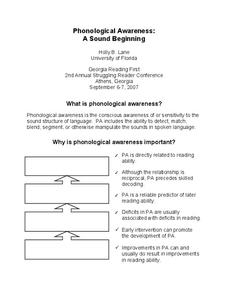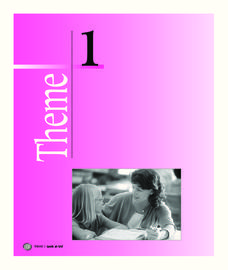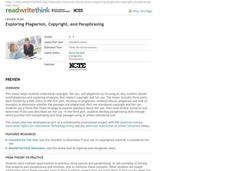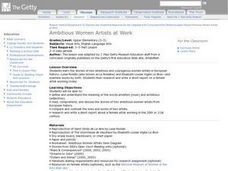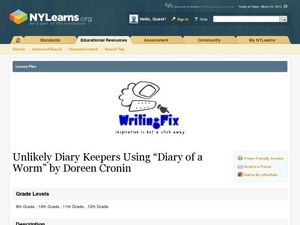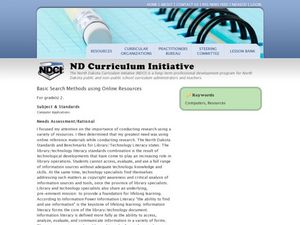University of Florida
Phonological Awareness: A Sound Beginning
Choose from a variety of phonological activities to complement a reading lesson. The guide goes through the basic components of good phonics instruction focusing on sound types, levels of phonological awareness, assessment methods, and...
Pulitzer Center
"Voices from Haiti": Using Poetry to Speak up for a Cause
Explore a real world use of poetry with your class! Young language arts pupils consider the concept of advocacy and how journalism, photography, and poetry can raise awareness for a cause. They read several poems about individuals...
Novelinks
The Giver: Concept Analysis
Cover the vocabulary and thematic concepts from Lois Lowry's The Giver with an extended reference guide. It includes relevant plot elements, discussions on themes and motifs, and any possible issues arising from your class's background...
Geography 360°
Poetry Writing
Put the tips and tricks in this guide into practice in order to encourage your pupils to blossom into poets. A wonderful reference material for teachers, this packet includes definitions of poetic terms and forms as well as step-by-step...
Florida Center for Reading Research
Vocabulary: Word Meaning, Inside Information
Support the acquisition of content area vocabulary with this foldable resource. With space for studying three new terms, pupils determine the definition, write a sentence, and provide examples for each word.
Florida Center for Reading Research
Vocabulary: Words in Context, Ask-Explain-List
Engage young readers in using context clues with this collaborative vocabulary activity. In pairs, children draw from a deck of cards, with each card asking a question about a context involving a specific vocabulary word. After...
Curated OER
Using Root Words as Clues
Delve deep into a Greek roots study with this graphic organizer. Scholars identify and define everyday words that are made from the Greek roots ast, bio, geo, and graph.
New Bedford Whaling Museum
A New Bedford Voyage!
A thorough set of activities, articles, and reference material can enlighten your class about the history of whaling in New England. Kids travel back to a time when whale products were valuable and hunting whales was a way to help the...
Curated OER
100 Questions
Gather around to play a game! Middle and high schoolers answer questions (provided here) using various reference materials. Bring encyclopedias and other reference materials to class, as each group has limited Internet access! An answer...
Curated OER
Use Or Abuse?
Young scholars explain the meaning of "use value" of nature's resources by researching and writing studenT books personifying an aspect of nature. They produce public service announcements regarding use value for their local community.
Houghton Mifflin Harcourt
Look at Us!: Extra Support Lessons (Theme 1)
Support struggling learners and focus on the alphabet with the three weeks of activities and materials provided here. Each day, learners review some letters and practice others in depth. They work on rhyming, practice new words, and...
International Reading Association
Children’s Choices 2014
Books for kids, chosen by kids! What could be better? This packet is made up of book lists, each with approximately 30 books included, organized by age group. Kids will enjoy the summer reading materials they choose from this resource!
Curated OER
Using the Comprehension Strategies
High school learners review the six major reading comprehension strategies. They demonstrate the strategies by putting them into action using more complex reading. They finish by discussing a seventh strategy, monitoring comprehension.
Curated OER
Using Word Maps to Expand Vocabulary
Looking for a good lesson on dictionary and word definition skills? The lesson presented here is for you! In it, learners utilize a worksheet, embedded in the plan, to record a word's definition(s), etymology, multiple meanings, related...
ReadWriteThink
Exploring Plagiarism, Copyright, and Paraphrasing
Plagiarism, copyright, and fair use are the focus of a three-part instructional activity designed to inform scholars of how to properly cite others' work. First, pupils use a KWL chart to begin thinking and discussing plagiarism. They...
J. Paul Getty Trust
Ambitious Women Artists at Work
Ambition is the keyword of a lesson that focuses on the contributions made by famous female artists. Specifically looking at European artists, Luisa Roldan and Elisabeth Louise Vigee Le Brun, scholars examine a piece of their work then...
Florida Center for Reading Research
Vocabulary: Word Meaning, Dictionary Cube
Scholars work together to define words and answer questions using a dictionary cube.
Curated OER
The Last Word: Using Critical Thinking and Analysis to Reach a Decision
Want to explore the process of writing a persuasive essay and tie it in with the upcoming elections? Class members use Venn diagrams and the hamburger model of persuasive writing to write a five-paragraph essay on elections and...
Curated OER
Unlikely Diary keepers Using Diary of a Worm by Doreen Cronin
Put your class in the shoes of someone - or something - else with this lesson, which encourages writers to keep a diary from the perspective of a living creature or an abstraction. Use Doreen Cronin's Diary of a Worm and the Six Trait...
EngageNY
Reading and Writing About How to Perform a Process: How Meg Lowman Studies the Rainforest (Pages 4–8)
It's a process. Scholars read to understand the process Meg Lowman uses for pressing specimens. Learners work in groups to define vocabulary and create a list of the steps used. They then carry out the steps using provided materials.
Curated OER
Olympic Shadow Boxes
What a cool way to incorporate art and use reference materials. Learners use classroom reference materials such as almanacs, encyclopedias, and dictionaries to answer one of four questions, and then they use the information to create a...
Curated OER
Basic Search Methods Using Online Resources
Second graders practice using technology to gather information. In this online research lesson, 2nd graders use technology to find information for a research project. Students write a research paper, and give a presentation to the class...
Crafting Freedom
Harriet Jabocs and Elizabeth Keckly: The Material and Emotional Realities of Childhood in Slavery
Learning how to make accurate inferences by putting together facts found in multiple sources is one of those skills all learners must develop, but one that can be a challenge to teach. This resource is a must-have for your curriculum...
Crafting Freedom
Harriet Jabocs and Elizabeth Keckly: The Material and Emotional Realities of Childhood in Slavery
Through the journals written by Harriet Jacobs and Elizabeth Keckly, young readers gain insight into the lives of two enslaved children on nineteenth-century plantations.


